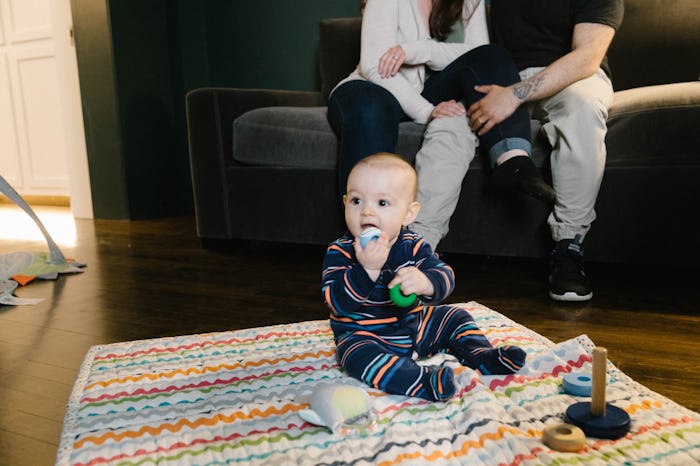Life
How To Help Your Baby Sleep Through Their Teething Pain, According To Experts
Calming a teething baby isn't easy. Like most things in parenting it's even harder at night, because everything is harder when you're sleep deprived. There are a wide variety of tools — from rubber animals and freezable teething rings to teething "eggs" and frozen wash cloths — that tired parents can introduce with the hopes of soothing their baby's teething pain, but can a baby sleep with a teether? According to experts, it's not a good idea. Thankfully for parents, and their teething babies, there are other sleep-related options that should help everyone rest easier and get the sleep they need (and, let's face it, deserve).
According to The Baby Sleep Site, teething pain can disrupt your baby's sleep, causing them to wake more frequently at night and to need more comfort by you, their parent, in order to fall back asleep. The site goes on to recommend parents use teething rings, toys, and frozen wash cloths to help a teething baby gnaw, chew, and numb their pain away. While these items are great for daytime teething relief, however and according to the site, a better option for bedtime and nap time (if your doctor says it's OK, and it's always worthwhile to check in with a pediatrician) is an over-the-counter pain reliever like acetaminophen or ibuprofen, which can ease a teething baby's pain and help them stay asleep longer.
The U.S. Food and Drug Administration (FDA) agrees, cautioning parents to always supervise their child when they use a teether or cold wash cloth, as they may be a choking hazard. They also warn parents to not use popular teething gels containing benzocaine or homeopathic teething tablets containing belladonna, as they can have dangerous side effects that can be potentially harmful to babies and young children.
According to the American Academy of Pediatrics (AAP), hard (but not frozen) teethers, cold wash cloths, and unsweetened teething crackers are good options for daytime teething relief. If your baby needs more relief or has symptoms like diarrhea, vomiting, or a fever, you should consult their pediatrician and come up with a doctor-recommended plan of action.
Your best bet for a helping a teething baby during those essential bedtime hours is to offer extra comfort while simultaneously making an effort to stick with your baby's routine. While it may be tempting to delay bedtime or bring your baby to bed with you during this tough period, both the AAP and the Baby Sleep Site caution parents to not give in to the temptation. While deviating from your normal routine during teething might seem easier in the short term, it can lead to bad sleep habits for your baby in the long term that will prove difficult for your baby to kick.
Luckily, teething is temporary, and with a little help your fussy baby can find some relief and both of you can get some oh-so necessary sleep.
